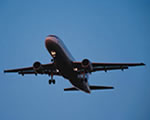 Go to main content
Go to main content
Archive Website of the UK government
Please note that this website has a UK government accesskeys system.
Main menu
Page menu
Environment and greener living

Air travel and the environment

Air travel is a growing contributor to climate change and can have an impact on local traffic emissions and noise. You can help reduce your impact on the environment by choosing to travel by air less. You can also offset the carbon emissions created by your journeys.
The wider issue
In 2006, air travel accounted for 6.4 per cent of the UK’s emissions of carbon dioxide (CO2), the main greenhouse gas causing climate change. Forecasts suggest that this could grow. If no action is taken, carbon dioxide emissions from aviation could make up around 10 per cent of the UK’s total CO2 emissions by 2020.
Air travel is also responsible for some non-carbon dioxide climate change effects, although there is still considerable scientific uncertainty about the scale of these impacts.
Try to travel less often
Reducing the amount you travel can lessen your impact on climate change – and could also save you time and money. There are often ways to achieve what you want without travelling as far or as often:
- consider video or teleconferencing, instead of flying to business meetings
- think about taking a holiday within the UK
- taking one longer holiday will have a lower impact than going on several short trips if you are flying each time
Consider alternatives to flying
If you do need to travel, using alternative means of getting there can help reduce your environmental impact. When making journeys in the UK, and even internationally, there is often the option of getting there without flying.
You may want to consider the relative CO2 emissions of your flight compared with using rail or coach travel, and the door-to-door journey time. Journey Planner can help you do this. As well as finding your route, it lets you compare CO2 emissions for different forms of transport so you can choose the greenest option.
On average, travelling by rail results in about a third of the CO2 emissions of the equivalent domestic or short-haul flight in Europe. Travelling by train is often as convenient as flying too.
Offset the impact of unavoidable flights
If air travel is unavoidable, you could think about offsetting your emissions.
Planes burn fuel when they fly, and this produces emissions that contribute to climate change. You can compensate for your emissions by paying someone to make an equivalent emissions saving or reduction – this is called carbon offsetting.
More and more air travel companies now offer an offsetting scheme when you purchase a flight. There is also a government quality mark you can look for, which could help you choose a good quality scheme. For more information, see the link below.
Carbon offsetting can help reduce the impact of your activities in the short term. However, it’s not a substitute for producing fewer emissions in the first place.
Take public transport to the airport
Road traffic is a major contributor to air pollution near airports. Leaving your car at home and finding other ways of travelling to the airport can help reduce climate change effects and local air pollution.
Airports usually have good public transport links, and you may find a bus or train quicker and more relaxing than going by car.
If you need to drive, many UK airports have car sharing schemes. Look at airport websites for more information, search online or try the link below to find a list of schemes.
 Facebook
Facebook Twitter
Twitter StumbleUpon
StumbleUpon Delicious
Delicious Reddit
Reddit